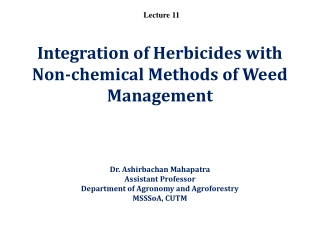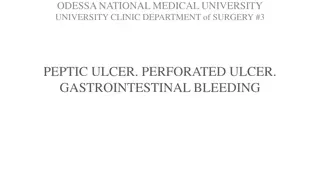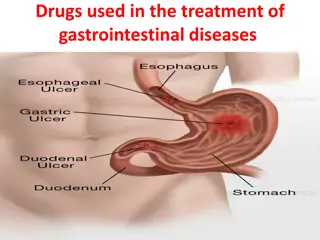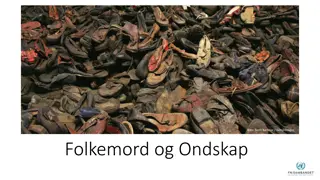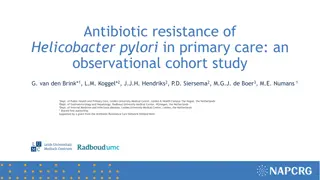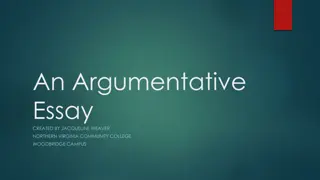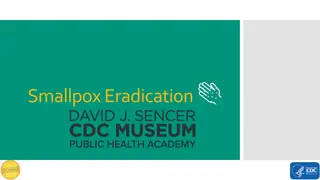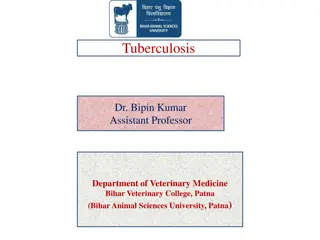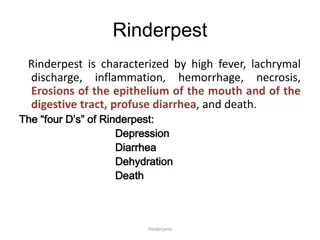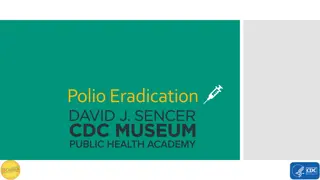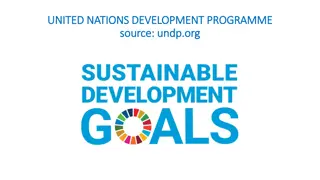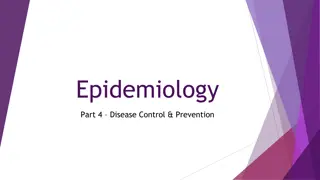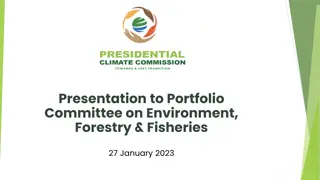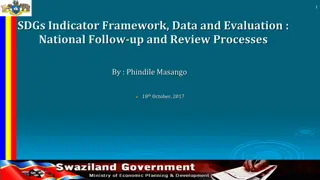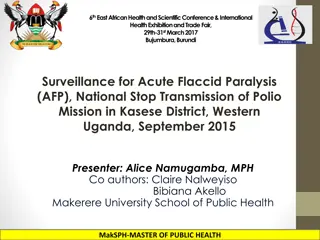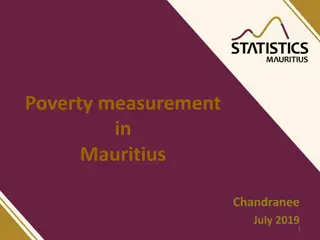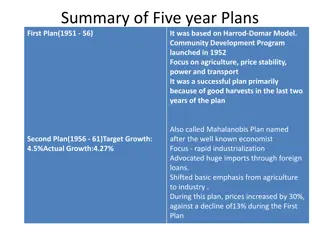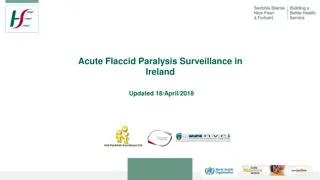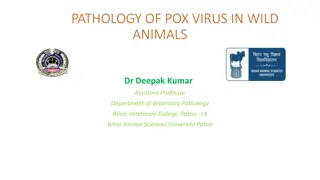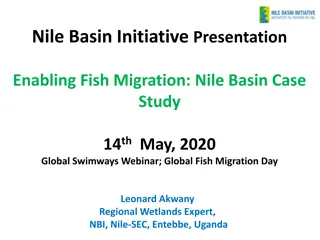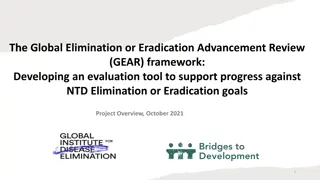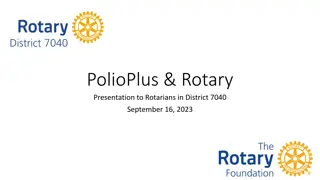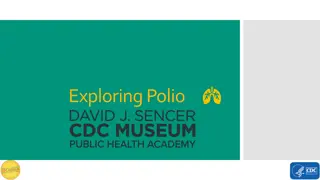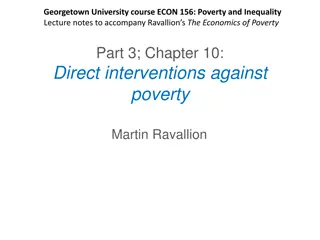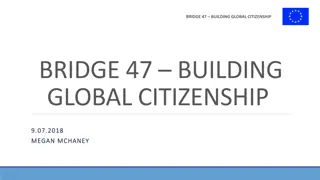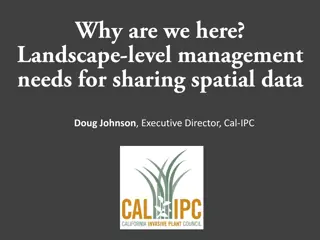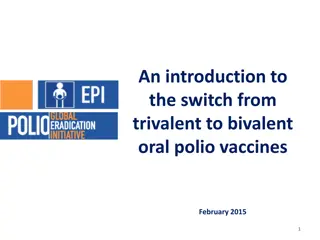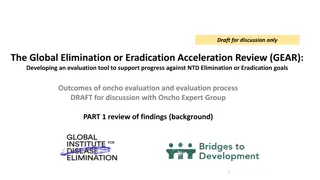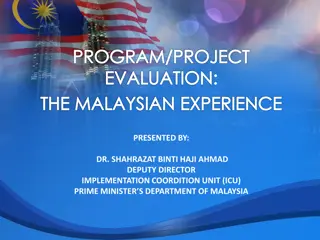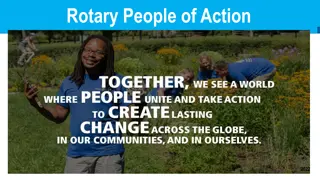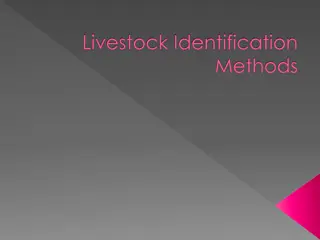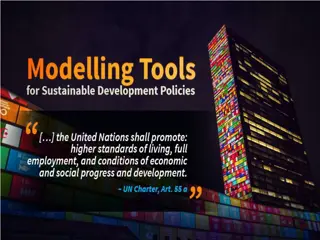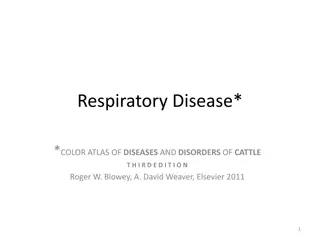Presentation to Portfolio Committee on Environment, Forestry & Fisheries
The presentation highlights the establishment and functions of the Presidential Climate Commission (PCC), focusing on the country's climate change response and transition to a low-carbon, climate-resilient economy. It emphasizes research, stakeholder consensus, and policy influence towards ecologica
0 views • 19 slides
Integrating Herbicides with Non-Chemical Weed Management Methods
The concept of weed management involves methods to enhance crop growth while discouraging weed invasion. Evolution shows the progression from manual labor to chemical methods. Weed management principles include eradication, prevention, and control. Eradication involves complete removal of weeds, whi
1 views • 34 slides
Understanding Peptic Ulcer Disease: Causes, Symptoms, and Treatment
Peptic ulcer disease (PUD) involves ulcerations in the duodenal or gastric mucosa caused by factors like Helicobacter pylori infection and NSAID use. Symptoms include abdominal pain and nausea, and treatment often involves H. pylori eradication and proton pump inhibitors to prevent complications lik
1 views • 77 slides
Understanding Spondylodiscitis: Diagnosis, Treatment, and Prognosis
Spondylodiscitis is an infectious inflammation affecting the spine's discs and adjacent vertebrae, posing challenges due to potential complications like abscess formation. Early diagnosis and prompt treatment are crucial for a favorable outcome, focusing on infection eradication, pain management, de
0 views • 22 slides
Peptic Ulcer Disease: Treatment Approaches and Helicobacter pylori Eradication
Common gastrointestinal conditions such as peptic ulcers can be effectively treated through approaches like eradicating H. pylori infection, reducing gastric acid secretion, and using mucosal protecting agents. Helicobacter pylori eradication is crucial for healing ulcers and preventing recurrence,
0 views • 27 slides
The Eradication of the Black Body: A Critical Analysis
Michelle Cowin-Mensah's research delves into the performative aspects of terrorism, racial profiling, and the dehumanization of the black body. Through the lens of performance studies, she explores how societal behaviors perpetuate systemic injustice and erode the emotional relevance of black indivi
1 views • 12 slides
Understanding Genocide: Connection Between Ethnic Cleansing and Evil
Explore the concept of genocide, as defined by the UN, through historical events like the Armenian Genocide and the Holocaust. Delve into the depths of evil and its association with acts of genocide within societies, touching upon the banality of evil and the systematic eradication of entire groups.
2 views • 10 slides
Antibiotic Resistance of Helicobacter pylori in Primary Care: Observational Cohort Study
Research focused on Helicobacter pylori eradication success and antibiotic resistance development in primary care settings, revealing an 8% rate of treatment failure leading to a second treatment within 12 months. The study suggests a need to revise treatment guidelines, potentially targeting specif
0 views • 6 slides
The Impact of Malaria Eradication Programs in Sub-Saharan Africa
Malaria, an infectious disease transmitted by mosquitoes, poses a significant threat in Sub-Saharan Africa where over half a billion people are affected annually. Despite various efforts including global eradication programs, the focus on prevention rather than treatment is deemed crucial to minimiz
0 views • 14 slides
The Eradication of Smallpox: A Triumph in Global Health
Smallpox, caused by the variola virus, was a deadly infectious disease that plagued humanity for centuries. Through concerted global efforts, including mass vaccination campaigns and the use of innovative strategies like ring vaccination, smallpox was successfully eradicated in 1980. The last natura
4 views • 16 slides
Bovine Tuberculosis: A Zoonotic Disease Impacting Humans and Animals
Bovine tuberculosis is a chronic bacterial disease affecting cattle and other mammals, with potential transmission to humans. Endemic in developing countries, it poses public health risks. Modes of transmission, clinical symptoms, diagnosis, and control measures are discussed, highlighting the impor
0 views • 22 slides
Understanding Rinderpest: Symptoms, Transmission, and Host Range
Rinderpest is a viral disease characterized by high fever, lachrymal discharge, inflammation, erosions of the mouth, and diarrhea, leading to death. The disease affects cloven-hoofed animals, with cattle and water buffalo being most susceptible. Transmission occurs through aerosol vectors and ingest
0 views • 60 slides
Understanding Polio Eradication Efforts and Vaccine Development
Polio, a disabling disease caused by the poliovirus, mainly affects children and can lead to paralysis. Efforts to eradicate polio include the development of vaccines like the Inactivated Polio Vaccine (IPV) and Oral Polio Vaccine (OPV). The poliovirus' choice of host, ease of transmission, and impa
0 views • 15 slides
United Nations Sustainable Development Goals (SDGs) Overview
The United Nations Sustainable Development Goals (SDGs), also known as the Global Goals, aim to end poverty, hunger, and various inequalities by 2030. There are 17 interconnected SDGs covering key aspects like poverty eradication, gender equality, climate action, and sustainable development. These g
1 views • 24 slides
Understanding Disease Control and Prevention in Epidemiology
This article discusses disease control processes in epidemiology, including reducing disease incidence, duration, and transmission. It covers public policy interventions, elimination, eradication, and extinction of infectious agents. It also highlights preventable causes of disease and different lev
2 views • 10 slides
Presentation to Portfolio Committee on Environment, Forestry & Fisheries
The Presentation to Portfolio Committee outlines the establishment and functions of the Presidential Climate Commission (PCC) with a focus on guiding the country towards a low-carbon, climate-resilient economy. The PCC aims to provide independent advice, research, and consensus-building to support s
0 views • 19 slides
Sustainable Development Goals: Progress and Alignment with National Development Strategies
The presentation outlines the transition from Millennium Development Goals (MDGs) to Sustainable Development Goals (SDGs), highlighting achievements and challenges faced. It discusses the alignment of SDGs and Agenda 2063 with national development strategies, focusing on areas such as agricultural d
0 views • 41 slides
Enhancing AFP Surveillance for Polio Eradication in East Africa
This presentation discusses the importance of Acute Flaccid Paralysis (AFP) surveillance in detecting poliomyelitis cases, with a focus on the National Stop Transmission of Polio Mission in Kasese District, Uganda. The goal is to eradicate poliovirus through strategies such as immunization campaigns
0 views • 12 slides
Poverty Measurement in Mauritius: An Overview of Monetary and Non-Monetary Approaches
The measurement of poverty in Mauritius involves multidimensional assessments using both monetary and non-monetary approaches. The country's national priorities include poverty eradication, improving well-being, and ensuring inclusive growth. The monetary approach assesses poverty based on the Relat
1 views • 12 slides
Overview of India's Five-Year Plans from 1951 to 1997
India implemented a series of Five-Year Plans from 1951 to 1997 with varying degrees of success. The First Plan (1951-56) focused on agriculture and industrialization, while the Second Plan (1956-61) aimed for economic growth but faced challenges due to external events like wars and droughts. Subseq
2 views • 6 slides
Acute Flaccid Paralysis Surveillance in Ireland - Update & Global Polio Eradication Efforts
The Acute Flaccid Paralysis (AFP) Surveillance in Ireland is crucial for monitoring poliomyelitis in the context of global polio elimination initiatives. With no cure for polio, prevention through vaccination is key. The global effort to eradicate polio has seen significant success, with a sharp dec
0 views • 21 slides
Pathology of Pox Virus in Wild Animals by Dr. Deepak Kumar
Pox viruses can affect wild animals, with Monkeypox emerging as a significant zoonotic virus in Central and West Africa. The disease shows similarities to smallpox but is less severe. Pox lesions are characteristic signs of infection, and outbreaks have been documented in regions with a history of s
0 views • 16 slides
Sustainable Development through Nile Basin Initiative: Focus on Fish Migration
Enabling fish migration in the Nile Basin through the Nile Basin Initiative is crucial for sustainable socio-economic development. The initiative aims to ensure equitable utilization of water resources, efficient water management, poverty eradication, and economic integration, benefiting the 11 coun
4 views • 13 slides
Transition to Green Economy in Kenya: Enabling Conditions by Dr. Charles Mutai
This presentation outlines the shift towards a green economy in Kenya, focusing on enabling conditions for sustainable development and poverty eradication. It discusses the concept of green economy, its benefits, and the global importance of transitioning to a more environmentally friendly economic
0 views • 22 slides
Developing GEAR Framework for NTD Elimination Progress Evaluation
Designing an evaluation framework for NTD elimination progress, the Global Elimination or Eradication Advancement Review (GEAR) aims to enhance efficiency and effectiveness. The project involves stakeholder engagement, pilot design, and tool refinement within a structured timeline for strategic impr
0 views • 12 slides
Rotary District 7040: PolioPlus and Rotary Presentation Highlights
Explore the impactful initiatives of the Rotary District 7040, focusing on PolioPlus, World Polio Day, the significance of polio eradication efforts, and club engagement strategies for fundraising. Learn about Joan Hunter's journey as the District Polio Chair and the current data on wild polio cases
0 views • 12 slides
Understanding Polio: Causes, Spread, and Eradication Efforts
Polio, a disabling and life-threatening disease caused by the poliovirus infection, can spread through contact with infected feces or droplets from sneezes/coughs. It mainly affects children, potentially leading to paralysis or respiratory issues. Lack of clean water and sanitation contributes to it
0 views • 15 slides
Understanding Poverty and Direct Interventions in Economics
The lecture notes explore the issues of persistent poverty due to various shocks and the challenges in eliminating global poverty. It discusses the policy debates surrounding direct interventions, economic arguments, constraints, and targeting strategies. The complexity of poverty eradication throug
0 views • 97 slides
Building Global Citizenship through Bridge 47 Initiative
Galvanising global citizenship, the Bridge 47 initiative aims to mobilize civil society for global justice and poverty eradication. Through global citizenship education, it seeks to foster an understanding of our interconnected world and empower individuals for transformative change. Emphasizing ret
0 views • 10 slides
Contemplating Technology's Impact on Humanity
Delve into a thought-provoking exploration of technology's role in shaping the future of humanity through discussions, poetry analysis, and reflection. Explore contrasting views on whether technology will bring salvation or destruction, ponder the poet Sara Teasdale's perspective on nature's respons
0 views • 8 slides
Addressing Invasive Plant Species in California
Executive Director Doug Johnson of Cal-IPC discusses the challenge of 200 invasive plant species across California's vast land, requiring spatial prioritization for eradication and containment. The solution involves aggregating digital datasets, collecting expert knowledge, assessing priorities base
0 views • 21 slides
Transitioning from Trivalent to Bivalent Oral Polio Vaccines: A Comprehensive Overview
This presentation outlines the rationale for the switch from trivalent to bivalent oral polio vaccines, highlighting the risks associated with the type 2 component of tOPV. It discusses the timeline and programmatic implications of the switch, emphasizing the need to introduce inactivated polio vacc
0 views • 20 slides
Accelerating Progress Against NTD Elimination: GEAR Evaluation Tool Discussion
Discussion draft for the Global Elimination or Eradication Acceleration Review (GEAR) focusing on evaluating progress against NTD elimination goals, specifically oncho outcomes. The draft covers findings, expert meeting goals, GEAR process overview, and strategic lessons for effectively presenting r
0 views • 13 slides
Enhancing Program and Project Evaluation: Insights from Malaysia
In the presentation by Dr. Shahrazat Binti Haji Ahmad, Deputy Director of the Implementation Coordination Unit at the Prime Minister's Department of Malaysia, the focus is on the importance of outcome-based approaches in evaluating program and project performance. The Malaysian government emphasizes
0 views • 15 slides
Embracing the Fulfillment of OT Hopes for a Reconciled Church
Explore the profound message of Zephaniah regarding the church as a reconciled community from every tribe and tongue. Delve into the dual basis of the call to wait, the overlap of ages, and the significance of Jesus in fulfilling these prophecies. Discover how believers are called to unity, global i
0 views • 7 slides
Rotary Foundation's Impactful Service Initiatives in 2022
Rotary's People of Action and Action Plan engage members in active service, offering district and global grants to help communities worldwide. The Rotary Foundation funds service actions, emphasizing service above self. Learn how clubs and Rotarians develop DDF to support grants and polio eradicatio
0 views • 5 slides
Livestock Identification Methods: Exploring Different Techniques
Explore the importance of livestock identification, methods used, and their significance in various situations. Understand why animals need to be identified, from proof of ownership to disease eradication. Learn about types of identification like branding, ear notching, tattooing, and more, each wit
0 views • 16 slides
Housing Challenges in South Africa: Backlog, Policies, and Demand
The housing situation in South Africa faces challenges despite policy frameworks aiming for adequate, sustainable housing for all. With a significant backlog, the demand greatly exceeds supply, leading to issues like informal settlements and slums. Policies like the Housing Act of 1997 and targets s
0 views • 16 slides
Modeling Sustainability and Global Commitments for 2030 Development Agenda
This content highlights international commitments such as the Sendai Framework for Disaster Risk Reduction, Addis Ababa Action Agenda, 2030 Agenda for Sustainable Development, and the Paris Agreement. It emphasizes the challenges of decision-making in complex environments, the importance of global m
0 views • 17 slides
Respiratory Diseases in Cattle: Causes, Infections, and Management
Respiratory diseases in cattle primarily stem from infectious agents such as infectious bovine rhinotracheitis and Pasteurella spp. These diseases compromise the defense mechanisms of the body, leading to infections like pneumonia and pleuropneumonia. Viruses, mycoplasmas, and bacteria like Histophi
0 views • 31 slides

